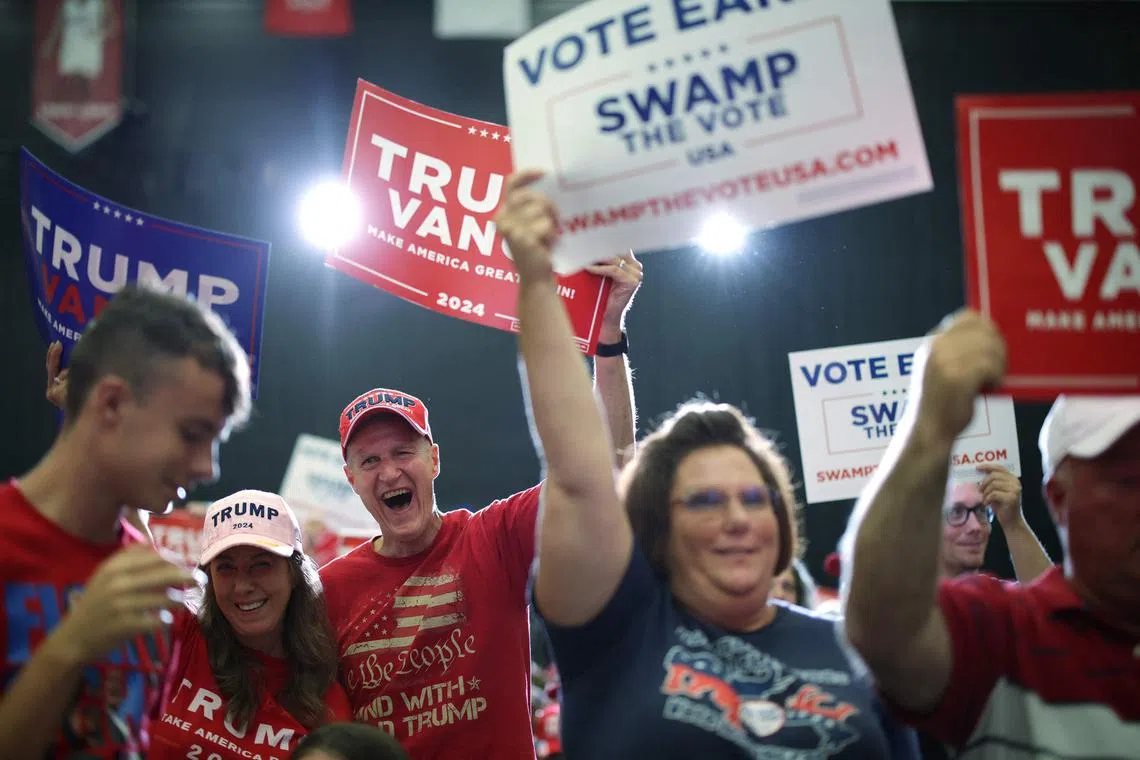Can Harris be blocked from ballots? Republican Party ponders post-Biden lawsuits
Sign up now: Get ST's newsletters delivered to your inbox

Election law experts are largely in agreement so far that such challenges are likely to fail, especially if Vice-President Kamala Harris swiftly locks up the nomination.
PHOTO: AFP
Follow topic:
WASHINGTON – President Joe Biden’s exit from the 2024 race
Election law experts of all political stripes are largely in agreement so far that such challenges are likely to fail, especially if Vice-President Kamala Harris swiftly locks up the nomination following Mr Biden’s endorsement. But the unprecedented situation opens the door to aggressive and creative lawyering.
Can Republicans sue to keep Biden’s replacement off the ballot?
Before Mr Biden’s withdrawal announcement on July 21,
But experts said that at this stage of the election cycle – before the Democratic Party formally selects its nominee and before state deadlines to certify candidates – judges would likely toss out lawsuits arguing that Mr Biden’s successor cannot appear on the November ballot.
A claim that Mr Biden’s exit disenfranchises voters “misunderstands” the presidential primary process, said Dr Justin Levitt, a professor and political law expert at Loyola Law School.
Primary voters choose delegates for their party’s nominating convention. Delegates generally are pledged to back a particular candidate, but they are not legally bound to do so, Dr Levitt said.
In addition, it was not clear who would have legal standing to bring a lawsuit, what law or right they could claim was violated, who they could name as a defendant or what courts would have the power to do. “You can’t force President Biden to accept the nomination,” he said.
“I find it impossible to believe a lawsuit like that would be successful,” said Mr Ben Ginsberg, a veteran campaign lawyer for Republican candidates and fellow at the Hoover Institution. “But for the performative art of thinking that might somehow cast doubt on Harris’ legitimacy, it’s not impossible that somebody will file a non-meritorious suit to try and dust things up.”
And then there is Ohio, where a debate about ballot access had been waged even before Mr Biden stepped aside.
Experts did flag a potential wrinkle for Ms Harris there. Ohio’s deadline for major political parties to certify presidential and vice-presidential candidates is Aug 7 – well before the Democratic National Convention begins on Aug 19.
Governor Mike DeWine, a Republican, signed legislation delaying that deadline to ensure Mr Biden could appear on state ballots, although the measure does not officially take effect until after the convention. Democrats had planned a virtual roll-call vote early to head off any complications.
Even if Democrats scrap the plan for the earlier roll-call vote, though, Mr Ginsberg said it is unlikely a judge would give serious weight to a ballot challenge since it was clear what Ohio lawmakers intended.
What other legal action is possible?
Federal Election Commission (FEC) chair Sean Cooksey suggested there could be legal challenges over how money contributed to Mr Biden’s campaign can be used. But one of his Democratic colleagues on the commission and conservative election law experts have disputed that.
Ms Harris has filed paperwork to update Mr Biden’s campaign committees to reflect her status as the presidential candidate. The Oversight Project of the conservative Heritage Foundation posted online on July 22 that it is actively studying whether her move was in accordance with the law.
But since Ms Harris was already affiliated with those committees as a candidate, she should be able to use the funds, said Mr Steve Roberts, a partner at Holtzman Vogel, which has represented Republican candidates and state parties.
He said speculation about potential legal action “may be wishful thinking” by his Republican colleagues.
Representatives of Republican presidential candidate Donald Trump’s campaign and the Republican Party did not immediately return requests for comment.
What is the timeline for legal action?
Another wrinkle for Trump and Republicans is time. There are just over 100 days until the Nov 5 general election. Complaints of campaign finance violations before the FEC can take months or even years to resolve. Courts will usually dismiss lawsuits as premature if challengers have not first exhausted their options before the commission.
Under federal law, a party can go to the federal court in Washington to sue the FEC if it believes the agency is moving too slowly – but only if the commission has failed to act within a 120-day window after a complaint is filed. BLOOMBERG

